Introduction
China has been constructing artificial islands and building military bases in the South China Sea (SCS), in order to consolidate its position in the region. China's activity completely disregards the historic ruling of the Permanent Court of Arbitration in The Hague in 2016, which favored the Philippines in its claims in the West Philippine Sea.[1] The ruling mainly stressed that Beijing's claims to historic rights and resources within its "nine-dash line" (recently China published a new 10-dash line map) have no legal basis. (See Appendix I)
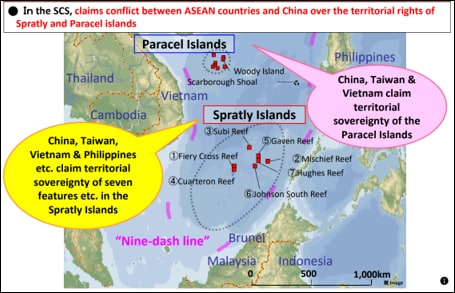
(Source: Mod.go.jp)

At the end of August 2023, China published a new map that sparked rage and concern, as it featured a 10-dash line claim to the South China Sea. Thus, it is extending its territorial claims far beyond its recognized Exclusive Economic Zone (EEZ). (Source: Japan Forward)
Yet, China rejected the court's ruling (See Appendix II, Appendix III),[2] and kept on "converting the South China Sea into a Lake of China."[3] The Japanese Ministry of Defense further reported: "Since 2014, China has pressed ahead with rapid and large-scale land reclamation works in 7 features in the Spratly islands... After completing reclamation, China militarizes the features further, continuously developing various infrastructure and deploying military assets."[4]

(Source: Mod.go.jp)
China's Militarization Of The Spratly Group Of Islands
The following are images showing how along the years China's developed and militarized its outposts in the Spratly group of Islands.
Development Of China's Outpost On The Johnson South Reef:
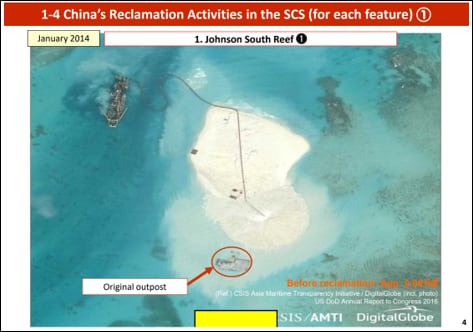
(Source: Mod.go.jp)

(Source: Mod.go.jp)
Development Of China's Outpost On The Hughes Reef:

(Source: Mod.go.jp)
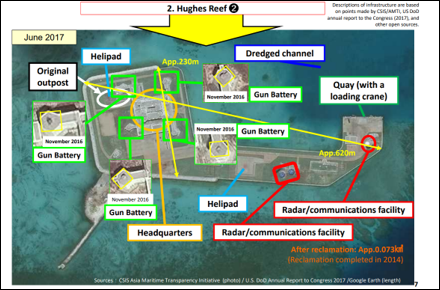
(Source: Mod.go.jp)
Development Of China's Outpost On The Cuarteron Reef:

(Source: Mod.go.jp)

(Source: Mod.go.jp)

An artificial island built by China in Cuarteron Reef on October 25, 2022, in the Spratly Islands, South China Sea. (Source: Ezra Acayan/Getty Images Getty Images)
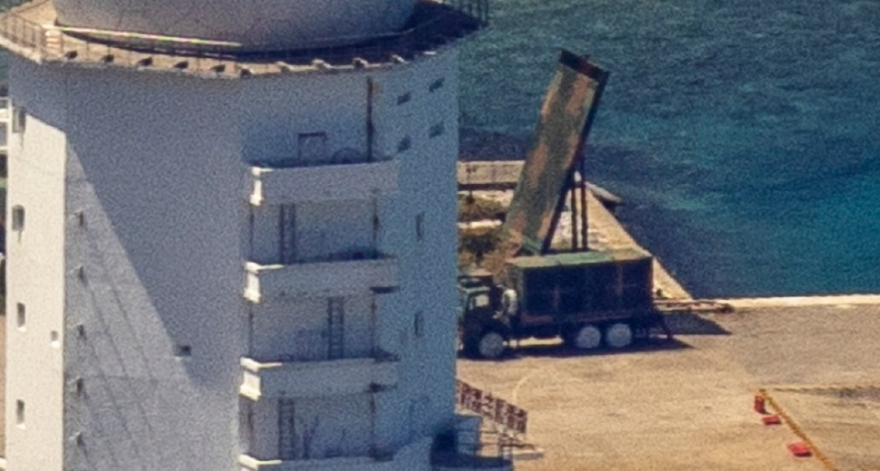
(Source: Ezra Acayan/Getty Images Getty Images)
Development Of China's Outpost On The Gaven Reefs:

(Source: Mod.go.jp)
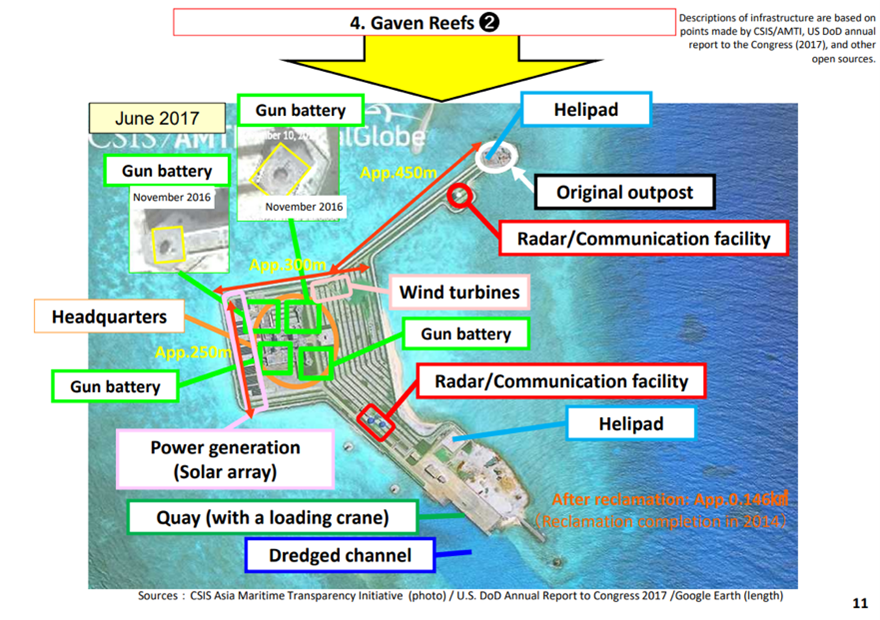
(Source: Mod.go.jp)
Development Of China's Outpost On The Fiery Cross Reef:

(Source: Mod.go.jp)

(Source: Mod.go.jp)
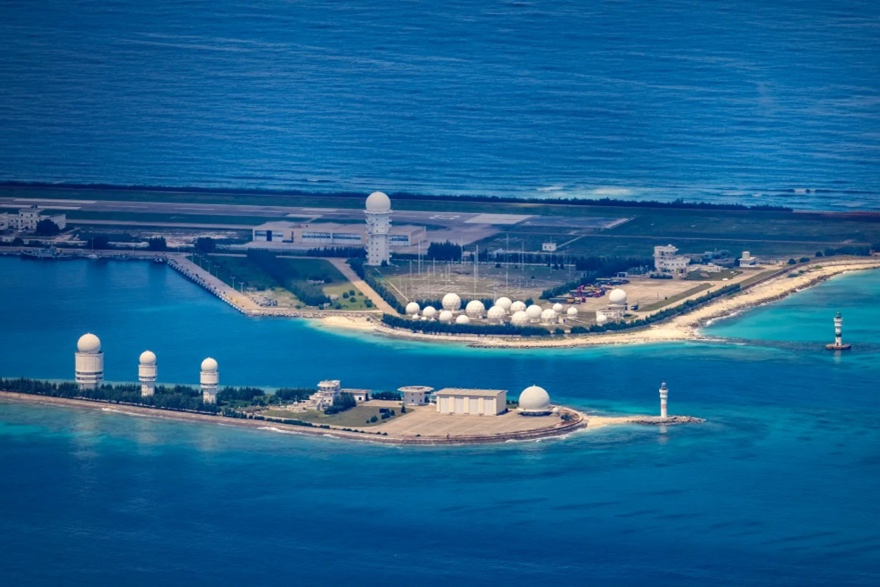
Fiery Cross Reef's installation. (Source: Ezra Acayan/Getty Images Getty Images)
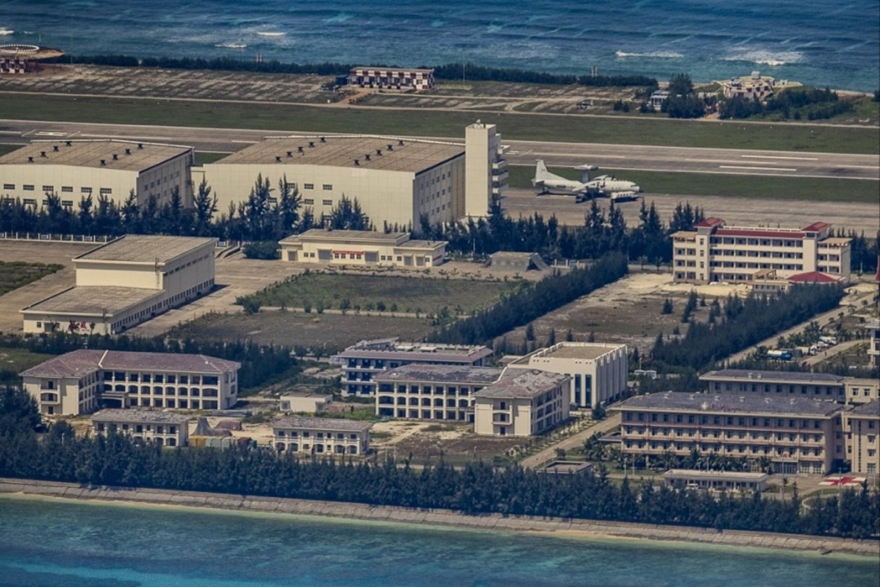
A plane sits on an airfield next to buildings and structures on the artificial island built by China at Fiery Cross Reef on October 25, 2022 in the Spratly Islands, South China Sea. (Source: Ezra Acayan/Getty Images)
Development Of China's Outpost On The Subi Reef:

(Source: Mod.go.jp)

(Source: Mod.go.jp)

A satellite image of Subi Reef, May 6, 2022. (Source: EO Browser, Sinergise Ltd.)

China's man-made Subi Reef with Chinese military base in the South China Sea, as seen from a Philippine Air Force plane. (Source: Bullit Marquez/Associated Press)
Development Of China's Outpost On The Mischief Reef:
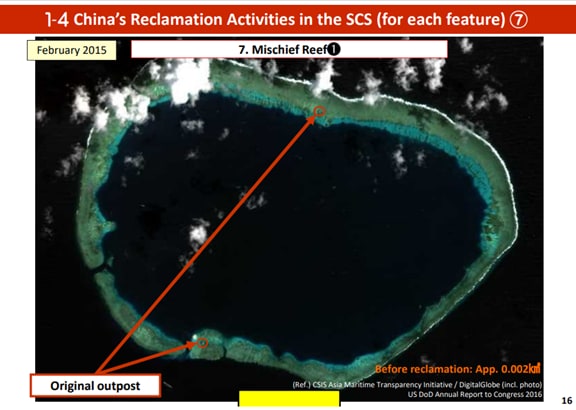
(Source: Mod.go.jp)

(Source: Mod.go.jp)
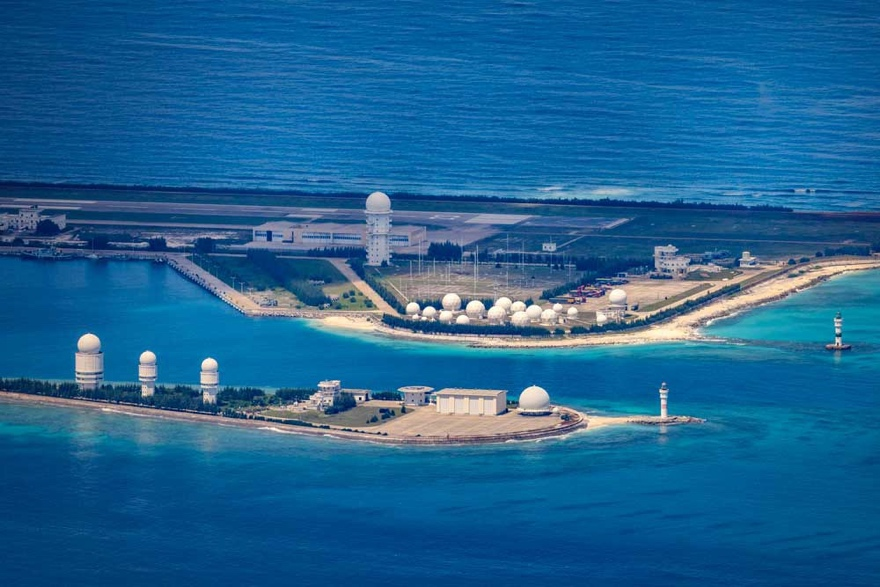
In this October 25, 2022 aerial photo, buildings, airstrips and communication structures are seen on the artificial island built by China in Mischief Reef in Spratly Islands, South China Sea. (Source: Ezra Acayan/Getty Images)
Security Implications Of China's Militarization Of The Spratly Islands
The Japanese Defense Ministry warned about the security implications of China's militarization of the Spratly Islands. In fact, the building of port facilities improves China's Intelligence, Surveillance, and Reconnaissance (ISR) and other mission capabilities in the South China Sea, while runaway constructions in the artificial islands will increase China's air force presence in the South China Sea.

(Source: Mod.go.jp)

(Source: Mod.go.jp)
APPENDIX I – The Verdict: Philippines Wins Arbitration Case Vs China, Philippine Star, July 12, 2016
Below is an article by the media outlet Philippine Star, analyzing historic ruling of the Permanent Court of Arbitration in The Hague in 2016, which favored the Philippines in its claims in the West Philippine Sea:
"No Evidence That China Has Exercised Exclusive Control Over The Disputed Waters Or Its Resources"
"The Permanent Court of Arbitration (PCA) under the United Nations ruled in favor of the Philippines in its arbitration case against China over the South China Sea.
"The Hague-based international tribunal ruled that China's nine-dash line claim over the disputed waters is invalid.
"'[A]s between the Philippines and China, China's claims to historic rights, or other sovereign rights or jurisdiction, with respect to the maritime areas of the South China Sea encompassed by the relevant part of the 'nine-dash line' are contrary to the Convention and without lawful effect to the extent that they exceed the geographic and substantive limits of China's maritime entitlements under the Convention,' the award read.
"The international tribunal found that it has jurisdiction to consider the dispute between the Philippines and China concerning historic rights and the source of maritime entitlements in the South China Sea.
"The tribunal pointed out that there was no evidence that China has exercised exclusive control over the disputed waters or its resources. 'The Tribunal concluded that there was no legal basis for China to claim historic rights to resources within the sea areas falling within the nine-dash line,' the PCA said in a press release issued on Tuesday.
"The arbitral tribunal also ruled that the features occupied by China in the Spratly Islands are not capable of generating maritime zones as the reefs have been heavily modified by reclamation and construction.
"'Having found that none of the features claimed by China was capable of generating an exclusive economic zone (EEZ), the Tribunal found that it could—without delimiting a boundary—declare that certain sea areas are within the exclusive economic zone of the Philippines, because those areas are not overlapped by any possible entitlement of China,' the PCA statement read."
"The Philippines Was The First Country To Challenge China's Expansive Claims"
"The PCA found that China violated the Philippines's sovereign rights in its exclusive economic zone by:
"-Interfering with Philippine fishing and petroleum exploration
"-Constructing artificial islands
"-Failing to prevent Chinese fishermen from fishing in the zone
"The international tribunal also held that China interfered with the rights of Filipino fishermen by restricting access at Scarborough Shoal.
"'Tribunal also found that Chinese authorities were aware that Chinese fishermen have harvested endangered sea turtles, coral, and giant clams on a substantial scale in the South China Sea (using methods that inflict severe damage on the coral reef environment) and had not fulfilled their obligations to stop such activities,' the tribunal said.
"The tribunal found that China's massive land reclamation activities in the region aggravated the dispute as it has inflicted irreparable harm to the marine environment and built an artificial island in the Philippines's EEZ.
"The Philippines was the first country to challenge China's expansive claims over the disputed waters.
"In October 2015, the UN tribunal ruled that it has jurisdiction to consider the Philippines's claims over the disputed sea and whether the claims are admissible.
"China has insisted that it will not respect the decision of the international tribunal and claimed that the arbitration case initiated by the Philippines under the administration of former President Benigno Aquino III was illegal from the beginning."
APPENDIX II – Statement Of The Ministry Of Foreign Affairs Of The People's Republic Of China On The Award Of 12 July 2016 Of The Arbitral Tribunal In The South China Sea Arbitration Established At The Request Of The Republic Of The Philippines, July 12, 2026
Below is the statement of China's Ministry of Foreign Affairs in reaction to the July 12, 2016 Award of the Arbitral Tribunal in the South China Sea: [5]
"The Award Is Null And Void And Has No Binding Force"
"With regard to the award rendered on 12 July 2016 by the Arbitral Tribunal in the South China Sea arbitration established at the unilateral request of the Republic of the Philippines (hereinafter referred to as the 'Arbitral Tribunal'), the Ministry of Foreign Affairs of the People's Republic of China solemnly declares that the award is null and void and has no binding force. China neither accepts nor recognizes it.
"1. On 22 January 2013, the then government of the Republic of the Philippines unilaterally initiated arbitration on the relevant disputes in the South China Sea between China and the Philippines. On 19 February 2013, the Chinese government solemnly declared that it neither accepts nor participates in that arbitration and has since repeatedly reiterated that position. On 7 December 2014, the Chinese government released the Position Paper of the Government of the People's Republic of China on the Matter of Jurisdiction in the South China Sea Arbitration Initiated by the Republic of the Philippines, pointing out that the Philippines' initiation of arbitration breaches the agreement between the two states, violates the United Nations Convention on the Law of the Sea (UNCLOS), and goes against the general practice of international arbitration, and that the Arbitral Tribunal has no jurisdiction. On 29 October 2015, the Arbitral Tribunal rendered an award on jurisdiction and admissibility. The Chinese government immediately stated that the award is null and void and has no binding force. China's positions are clear and consistent"
"The Unilateral Initiation Of Arbitration By The Philippines Is Out Of Bad Faith"
"2. The unilateral initiation of arbitration by the Philippines is out of bad faith. It aims not to resolve the relevant disputes between China and the Philippines, or to maintain peace and stability in the South China Sea, but to deny China's territorial sovereignty and maritime rights and interests in the South China Sea. The initiation of this arbitration violates international law. First, the subject-matter of the arbitration initiated by the Philippines is in essence an issue of territorial sovereignty over some islands and reefs of Nansha Qundao (the Nansha Islands) [Spratly Islands], and inevitably concerns and cannot be separated from maritime delimitation between China and the Philippines. Fully aware that territorial issues are not subject to UNCLOS, and that maritime delimitation disputes have been excluded from the UNCLOS compulsory dispute settlement procedures by China's 2006 declaration, the Philippines deliberately packaged the relevant disputes as mere issues concerning the interpretation or application of UNCLOS. Second, the Philippines' unilateral initiation of arbitration infringes upon China's right as a state party to UNCLOS to choose on its own will the procedures and means for dispute settlement. As early as in 2006, pursuant to Article 298 of UNCLOS, China excluded from the compulsory dispute settlement procedures of UNCLOS disputes concerning, among others, maritime delimitation, historic bays or titles, military and law enforcement activities. Third, the Philippines' unilateral initiation of arbitration violates the bilateral agreement reached between China and the Philippines, and repeatedly reaffirmed over the years, to resolve relevant disputes in the South China Sea through negotiations. Fourth, the Philippines' unilateral initiation of arbitration violates the commitment made by China and ASEAN Member States, including the Philippines, in the 2002 Declaration on the Conduct of Parties in the South China Sea (DOC) to resolve the relevant disputes through negotiations by states directly concerned. By unilaterally initiating the arbitration, the Philippines violates UNCLOS and its provisions on the application of dispute settlement procedures, the principle of 'pacta sunt servanda' and other rules and principles of international law."
"The Conduct Of The Arbitral Tribunal And Its Awards Seriously Contravene The General Practice Of International Arbitration"
"3. The Arbitral Tribunal disregards the fact that the essence of the subject-matter of the arbitration initiated by the Philippines is issues of territorial sovereignty and maritime delimitation, erroneously interprets the common choice of means of dispute settlement already made jointly by China and the Philippines, erroneously construes the legal effect of the relevant commitment in the DOC, deliberately circumvents the optional exceptions declaration made by China under Article 298 of UNCLOS, selectively takes relevant islands and reefs out of the macro-geographical framework of Nanhai Zhudao (the South China Sea Islands), subjectively and speculatively interprets and applies UNCLOS, and obviously errs in ascertaining facts and applying the law. The conduct of the Arbitral Tribunal and its awards seriously contravene the general practice of international arbitration, completely deviate from the object and purpose of UNCLOS to promote peaceful settlement of disputes, substantially impair the integrity and authority of UNCLOS, gravely infringe upon China's legitimate rights as a sovereign state and state party to UNCLOS, and are unjust and unlawful."
"China Does Not Accept Any Means Of Third-Party Dispute Settlement Or Any Solution Imposed On China"
" 4. China's territorial sovereignty and maritime rights and interests in the South China Sea shall under no circumstances be affected by those awards. China opposes and will never accept any claim or action based on those awards.
"5. The Chinese government reiterates that, regarding territorial issues and maritime delimitation disputes, China does not accept any means of third-party dispute settlement or any solution imposed on China. The Chinese government will continue to abide by international law and basic norms governing international relations as enshrined in the Charter of the United Nations, including the principles of respecting state sovereignty and territorial integrity and peaceful settlement of disputes, and continue to work with states directly concerned to resolve the relevant disputes in the South China Sea through negotiations and consultations on the basis of respecting historical facts and in accordance with international law, so as to maintain peace and stability in the South China Sea."
APPENDIX III – Statement Of The Government Of The People's Republic Of China On China's Territorial Sovereignty And Maritime Rights And Interests In The South China Sea, July 12, 2016
Below is China's statement on "China's Territorial Sovereignty and Maritime Rights and Interests in the South China Sea:" [6]
"To reaffirm China's territorial sovereignty and maritime rights and interests in the South China Sea, enhance cooperation in the South China Sea with other countries, and uphold peace and stability in the South China Sea, the Government of the People's Republic of China hereby states as follows:
"The Activities Of The Chinese People In The South China Sea Date Back To Over 2,000 Years Ago"
"I. China's Nanhai Zhudao (the South China Sea Islands) consist of Dongsha Qundao (the Dongsha Islands) [Pratas Island], Xisha Qundao (the Xisha Islands) [Paracel Islands], Zhongsha Qundao (the Zhongsha Islands) [the Macclesfield Bank] and Nansha Qundao (the Nansha Islands) [Spratly Islands]. The activities of the Chinese people in the South China Sea date back to over 2,000 years ago. China is the first to have discovered, named, and explored and exploited Nanhai Zhudao and relevant waters, and the first to have exercised sovereignty and jurisdiction over them continuously, peacefully and effectively, thus establishing territorial sovereignty and relevant rights and interests in the South China Sea.
"Following the end of the Second World War, China recovered and resumed the exercise of sovereignty over Nanhai Zhudao which had been illegally occupied by Japan during its war of aggression against China. To strengthen the administration over Nanhai Zhudao, the Chinese government in 1947 reviewed and updated the geographical names of Nanhai Zhudao, compiled Nan Hai Zhu Dao Di Li Zhi Lüe (A Brief Account of the Geography of the South China Sea Islands), and drew Nan Hai Zhu Dao Wei Zhi Tu (Location Map of the South China Sea Islands) on which the dotted line is marked. This map was officially published and made known to the world by the Chinese government in February 1948."
"China Has Been Firm In Upholding China's Territorial Sovereignty And Maritime Rights And Interests In The South China Sea"
"II. Since its founding on 1 October 1949, the People's Republic of China has been firm in upholding China's territorial sovereignty and maritime rights and interests in the South China Sea. A series of legal instruments, such as the 1958 Declaration of the Government of the People's Republic of China on China's Territorial Sea, the 1992 Law of the People's Republic of China on the Territorial Sea and the Contiguous Zone, the 1998 Law of the People's Republic of China on the Exclusive Economic Zone and the Continental Shelf and the 1996 Decision of the Standing Committee of the National People's Congress of the People's Republic of China on the Ratification of the United Nations Convention on the Law of the Sea, have further reaffirmed China's territorial sovereignty and maritime rights and interests in the South China Sea.
"China Has Sovereignty Over Nanhai Zhudao"
"III. Based on the practice of the Chinese people and the Chinese government in the long course of history and the position consistently upheld by successive Chinese governments, and in accordance with national law and international law, including the United Nations Convention on the Law of the Sea, China has territorial sovereignty and maritime rights and interests in the South China Sea, including, inter alia:
"i. China has sovereignty over Nanhai Zhudao, consisting of Dongsha Qundao, Xisha Qundao, Zhongsha Qundao and Nansha Qundao;
"ii. China has internal waters, territorial sea and contiguous zone, based on Nanhai Zhudao;
"iii. China has exclusive economic zone and continental shelf, based on Nanhai Zhudao;
"iv. China has historic rights in the South China Sea.
"The above positions are consistent with relevant international law and practice."
[1] See the Court Arbitration: https://docs.pca-cpa.org/2016/07/PH-CN-20160712-Award.pdf, July 12, 2016; Philstar.com/headlines/2016/07/12/1602128/full-text-permanent-court-arbitration-ruling-philippines-case-vs-china, July 12, 2016;
Uscc.gov/sites/default/files/Research/Issue%20Brief_South%20China%20Sea%20Arbitration%20Ruling%20What%20Happened%20and%20What%27s%20Next071216.pdf, July 12, 2016; Pca-cpa.org/en/cases/7/
[2] See Full Text: China Adheres to the Position of Settling Through Negotiation the Relevant Disputes Between China and the Philippines in the South China Sea, July 13, 2016.
[3] See MEMRI TV clip no. 10954, Philippine Defense Secretary Gibo Teodoro: China Is Attempting To Force Countries To Accept Its Claims To Sovereignty In The Entire South China Sea, December 15, 2023; Opinion.inquirer.net/139344/the-territorial-dispute-in-the-spratlys, April 15, 2021.
[4] Mod.go.jp, March 2024.
[5] Fmprc.gov.cn/eng/wjdt_665385/2649_665393/201607/t20160712_679470.html, July 12, 2016.
[6] Bg.china-embassy.gov.cn/eng/dtxw/201607/t20160712_2182271.htm, July 12, 2016.





